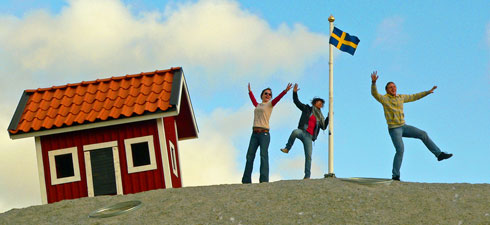A while back, I contacted riff-raff, who produce an excellent communist journal in Sweden, and asked them if they could give a critical perspective in English on the Nordic model as well as how it’s being used in the Scottish Independence debate. One of their members kindly offered some thoughts, giving a class analysis and looking at the debate in an international context. It gives a good grounding for others to look at things from a critical Marxist stance. I should add that it was written before the riots in Stockholm last week, and we’d be interested in more attempts to understand these developments.

It is difficult to say what would happen exactly if Scotland were to become an independent state, but no matter what happens, this I think is true: In any capitalist country, a certain amount of value is appropriated each year; value produced within the country or value flowing from abroad. This is the gross value added or total value product, which is distributed to the various classes. Marx argues that within the specifically capitalist mode of production there are three main, fetishistic, sources of revenue: wages for productive labour, industrial profits and rent in various forms (e.g. land rent). The real source of all abstract, economic wealth, however, is productive labour: workers who directly increase the existing capital thanks to their capacity to perform surplus labour – more labour than is represented by their wages – to produce surplus value. Apart from wages, then, all other forms of income are derived from surplus value. Industrial capitalists are living on the productive workers; unproductive workers are paid from the profits of the industrial capitalist; as are the owners of natural resources, through monopoly prices. As Marx remarks, the land owner does not have to perform any work at all to receive his income. He also does not have to take the risk that is associated with producing commodities, although he still might do so. So how does this relate to the question of Scottish independence? Independence could change the distribution shares of the total value/price that is appropriated. If an independent Scotland would mean that more money derived from important natural resources, e.g. oil, were to go to people in Scotland, as opposed to those who are living in England and Wales, there is the possibility that all classes in Scotland gain from this. One could envisage for example that oil wells are nationalised and the income from these is handed out to every individual in cash or in the form of better health care. One could also well envisage that some groups or classes were to receive more of this income than others (tax cuts for the rich but just as bad healthcare). But this also means that less income would go to all the classes in England and Wales. Perhaps the London capitalists would become poorer, but English workers are likely to become poorer too. If in a different scenario Scottish independence would mean that Scotland got poorer and England and Wales richer, for example because less subsidies are paid from England and Wales to Scotland, then the opposite would be true.
Norway’s oil is owned by the state and its income benefits the population as a whole. It is well known that their living standards are very high and they are at the top of the Human Development Index (HDI). It is somewhat the same as regards Sweden’s natural resources (iron ore, the large forests, etc.). But if Norway and, to a lesser degree, Sweden are rich, this is much due to the fact that we are living on workers abroad. These incomes are land rents and this is unpaid labour, extracted from workers somewhere. To fight for independence to gain control of and extract monetary value from natural resources is therefore a struggle to live on the toil of others. Individuals, groups and nationalities may gain economically from such a struggle, but it does not help the world proletariat to loosen its chains. A struggle for higher wages, on the other hand, or better health care, can transfer money from the non-working classes to the proletariat. And we can be sure that the non-working classes will try to win this money back, either from workers close to home or far way. The struggle between capital and the proletariat over the working day and its value product does not by itself bring about a revolution, but if the proletarians are successful, they may 1) directly improve their living standards and 2) make the capitalists extract less surplus value, which could make the capitalist system as a whole work less smoothly, which in turn might heighten the class struggles and help bring about the will and determination of the world proletariat to put an end to world capitalism once and for all.
I should add that having a lot of natural resources does not necessarily bring about high living standards under capitalism. Norway is really an exception as regards equitable distribution of rental incomes. Nigeria has got huge oil deposits but is at the bottom on the HDI. Furthermore, the existence of land rent may just mitigate an otherwise problematic situation of slow capital accumulation. Despite all its hydro-electric energy, large deposits of iron ore and other metals, forests, and a highly educated workforce, Sweden had to make huge welfare cuts in the early 1990s and legalised precarious terms of employment. By “had to” I mean of course that it was necessary to maintain stable capitalist reproduction. Today’s Greece serves as an example of what happens if the government does not do what is necessary.


Pingback: Beyond the Scottish referendum | AFed Scotland
Pingback: A’ dol thairis air an reifreann Albannach | AFed Scotland